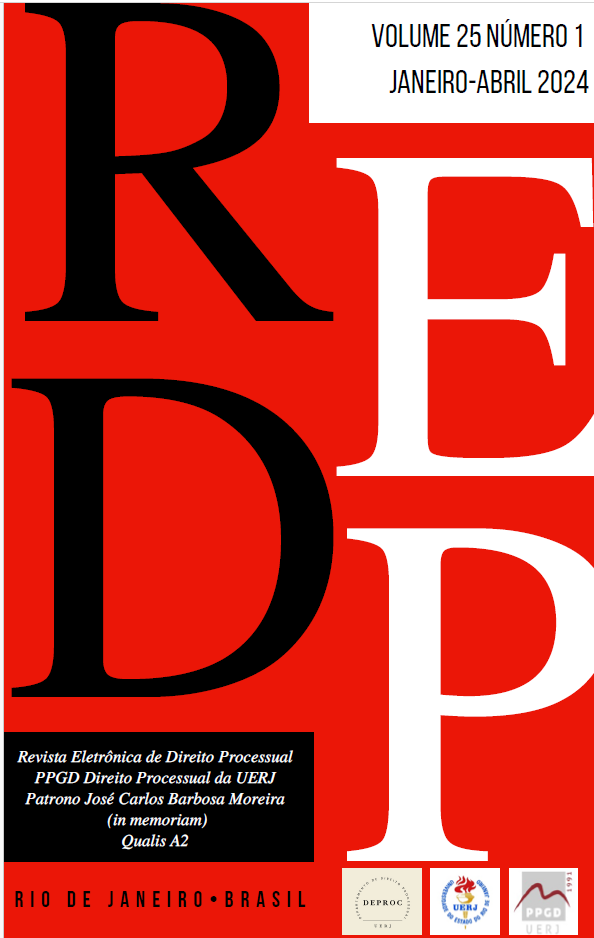A VINCULAÇÃO DO ÁRBITRO AOS PRECEDENTES JUDICIAIS E O CABIMENTO DA AÇÃO ANULATÓRIA DE SENTENÇA ARBITRAL
DOI:
https://doi.org/10.12957/redp.2024.81880Resumo
A sentença arbitral equipara-se à sentença judicial, sendo também prevista dentre os títulos executivos judiciais, conforme disposto no artigo 515, inciso VII, do Código de Processo Civil. A partir do sistema de precedentes vinculantes previsto no Código de Processo Civil de 2015, surgiu o questionamento se os árbitros estariam vinculados aos precedentes judiciais e, se estiverem, se a inobservância de um precedente judicial na arbitragem ensejaria a ação anulatória de sentença arbitral. O presente artigo tem, portanto, como objetivo, analisar a vinculação do árbitro aos precedentes judiciais e analisa o cabimento da ação anulatória de sentença arbitral, contemplada no artigo 32 da Lei nº 9.307/1996, diante da inobservância de precedente judicial vinculante. A partir de artigos especializados, teses de doutorado e obras doutrinárias, com um tratamento qualitativo às informações obtidas, é possível destacar que o árbitro vincula-se aos precedentes judiciais na medida em que estes integram o próprio Direito brasileiro, isto é, a aplicação do direito brasileiro não se esgota no texto legal. Já em relação ao cabimento da ação anulatória, tem-se como argumentos contrários que admitir a utilização da ação anulatória por desrespeito ao precedente permitiria possibilidade amplíssima de ataque a sentenças arbitrais, proporcionando a revisão da sentença arbitral no Poder Judiciário sem que estivesse previsto o cabimento da ação anulatória em qualquer uma das hipóteses elencadas no artigo 32 da Lei nº 9.307/1996 e que no ordenamento jurídico brasileiro, a sentença arbitral não teria inteiramente o mesmo regramento da sentença judicial, já que, tratando-se de sentença judicial, há a previsão do cabimento de ação rescisória por violação manifesta à norma jurídica (artigo 966, inciso V, do Código de Processo Civil), mas caso o árbitro violasse, em sua sentença, literal disposição de lei, não haveria previsão de ação anulatória de acordo com o artigo 32 da Lei nº 9.307/1996. Porém, é preciso lembrar que os precedentes vinculantes asseguram a isonomia, a segurança jurídica nos julgamentos e a absoluta observância ao devido processo legal, seu desrespeito poderia ser caracterizado como violação da ordem pública, ensejando não só o dever do árbitro de observância aos precedentes vinculantes, como o cabimento da ação anulatória em caso de inobservância.
Downloads
Publicado
Como Citar
Edição
Seção
Licença
Copyright (c) 2024 Aluisio Gonçalves De Castro Mendes

Este trabalho está licenciado sob uma licença Creative Commons Attribution 4.0 International License.
Todos os artigos publicados na Revista Eletrônica de Direito Processual (REDP) (Departamento de Direito Processual, Universidade do Estado do Rio de Janeiro, Brasil) são licenciados por meio de uma Licença Creative Commons - Atribuição 4.0 Internacional (CC BY 4.0).
Os autores retêm os direitos autorais de seu artigo e concordam em licenciar seu trabalho com a licença CC BY 4.0, aceitando assim os termos e condições específicos desta licença disponíveis no seguinte website: https://creativecommons.org/licenses/by/4.0/legalcode.
- Os autores concedem à REDP o direito de primeira publicação, de se identificar como publicadora original do trabalho e concedem à revista uma licença de direitos não exclusivos para utilizar o trabalho das seguintes formas: Reproduzir, vender e distribuir cópias eletrônicas ou impressas do manuscrito como um todo, de partes específicas do manuscrito e de suas traduções para qualquer idioma;
- O uso do artigo por terceiros é livre, contanto que a integridade da publicação seja mantida e seus autores originais, periódico de primeira publicação e detalhes de citação sejam identificados.
Dentro dos termos da licença, os autores podem entrar em acordos contratuais adicionais separados para a distribuição não exclusiva da versão publicada do trabalho na revista.
Copyright and Licensing
All articles published in the Procedural Law Electronic Review (REDP) (Department of Procedural Law, State University of Rio de Janeiro, Brazil) are licensed under a Creative Commons License - Attribution 4.0 International (CC BY 4.0).
- Authors retain copyright to their article and agree to license their work under the CC BY 4.0 license, thereby accepting the specific terms and conditions of this license available at the following website: https://creativecommons.org/licenses/by/4.0/ legal code.
- Authors grant REDP the right of first publication, to identify itself as the original publisher of the work, and grant the journal a non-exclusive license to use the work in the following ways: Reproduce, sell and distribute electronic or printed copies of the manuscript as a whole, of specific parts of the manuscript and its translations into any language;
- Use of the article by third parties is free, as long as the integrity of the publication is maintained and its original authors, first publication journal, and citation details are identified.
Within the terms of the license, authors may enter into separate additional contractual agreements for the non-exclusive distribution of the published version of the work in the journal.




